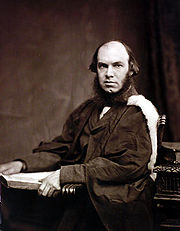1835-1908
 Caird, a part of the idealist movement in Great Britain, was Fellow of Merton College, Oxford, professor of moral philosophy in the University of Glasgow and Master of Balliol College, Oxford.
Caird, a part of the idealist movement in Great Britain, was Fellow of Merton College, Oxford, professor of moral philosophy in the University of Glasgow and Master of Balliol College, Oxford.
- Was known for his work on Kant in A Critical Account of the Philosophy of Kant (later editions published under the title The Critical Philosophy of Kant)
- Gave the Gifford Lectures on the evolution of religion and the evolution of theology.
- Held that the very conflict between idealism and materialism demanded a synthesis. He rejected that "common sense" could adjudicate these tensions in light of Humean skepticism.
- In Caird’s opinion, Kant provided a unifying synthesis: "The distinction between subject and object emerges within the unity of consciousness, a unity which is fundamental." (Copleston). This unity is present in science.
- Caird viewed religion as being formed out of the awareness of this unity in conflict. He saw three stages in the development of religion
- Stage 1: awareness of object (materialism)
- Stage 2: awareness of subject (idealism)
- Stage 3: awareness of the unification of both stages (religion)
- Caird was the brother of John Caird, Presbyterian theologian and preacher and professor of divinity at the University of Glasgow
Quote of the day: On subject and object, “We are forced to seek the secret of their being in a higher principle, of whose unity they in their action and reaction are the manifestations, which they presuppose as their beginning and to which they point as their end.”
Post Views: 292








